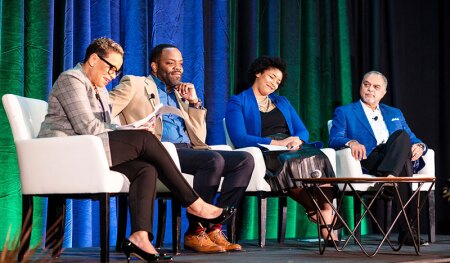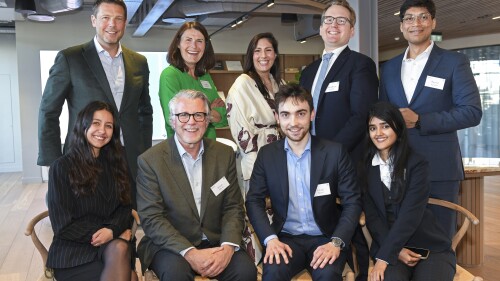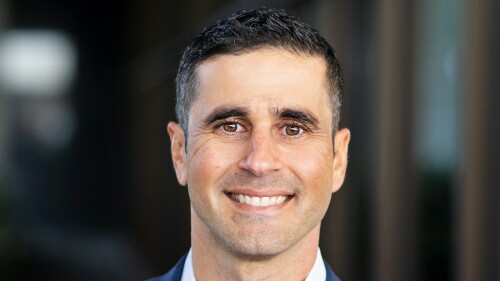
A session at the ULI Fall Meeting in Dallas, moderated by Collete English Dixon, executive director at the Marshall Bennett Institute of Real Estate at Roosevelt University.Dixon was joined by Jarred Howard, principal of the Sable Group; Maggie Parker, managing partner and founder of Innovan Neighborhoods; and Brian Dennison, senior vice president of development and asset management for Fort Worth Housing Solutions.
Despite challenges, there is momentum in commercial real estate for capital to be raised and invested in underserved communities across the nation, according to a panel of Dallas/Fort Worth developers at the Fall Meeting in Dallas.
The primary example they used to illustrate success is the National Juneteenth Museum in Fort Worth. Construction is expected to begin by year-end or in the first quarter of 2023, and the grand opening is planned for mid-2025.
Fort Worth announced last month that the City Council unanimously approved a resolution pledging $15 million to the development of the museum in the city’s Historic Southside neighborhood.
The contribution will only be made once the balance needed for the $70 million project is raised.
In the works for several years, the project was formally announced in December 2021. The museum will be on the second level of a two-story building. The lower level will feature a restaurant, business incubator, 250-seat amphitheater, and storefronts. The three adjacent residential buildings will have 55 residences.
Fort Worth resident and activist Opal Lee was part of the impetus behind the Juneteenth federal holiday. Juneteenth had been celebrated in Texas for many years to commemorate June 19, 1865, when Union Army General Gordon Granger proclaimed freedom for slaves in Texas. She was on hand at the session, offering introductory comments and encouragement.
Lee was joined by Maggie Parker, managing partner and founder of Innovan Neighborhoods; Jarred Howard, principal of the Sable Group; and Brian Dennison, senior vice president of development and asset management for Fort Worth Housing Solutions. The session was moderated by Collete English Dixon, executive director at the Marshall Bennett Institute of Real Estate at Roosevelt University.
Investors Don’t Have to “Give Anything Away” in the Deal
Parker said that as the United States is becoming more diverse, this diversity must be reflected in all aspects of real estate. However, raising capital for such projects has often not been easy.
Equitable investment does not mean that money is being given away, Dixon said. “It doesn’t have to be a mission-based project, and investors don’t have to give anything away on the deal.”
Every project needs political capital, and Dennison said developers need to know where the funding for the needed infrastructure is going to come from and what collaborative players will contribute.
The museum did not get done without partnerships, Howard said.
“When we first came in, we asked for permission from the residents,” he said. “We called a community meeting and listened to them. These were people who had lived here for 40 or 50 years, and they had a history of profoundly opposing anything to do with their neighborhood.”
Getting the “backbone” of the community on their side made a huge difference.
“This is not just a museum,” Howard said. “The residents said they wanted a food establishment, and that none of them had a sit-down restaurant in their area, so we provided one. We also created a business incubator program for residents to learn more about business, and this has helped to create jobs.”
Facing Resident Displacement Challenges
The developers chose to locate the museum in an area of Fort Worth (901 E. Rosedale St.) that had been underserved. While the area is developed to the West, North, and South, residents in areas to the east had fought against any re-development to occur there until The Sable Group made a compelling case to do so.
“It’s a situation like many in core spaces where all surrounding areas are exhausted with development, except the last one,” Dixon said. “And in that case, it could end up displacing those residents. This is the familiar storyline for inequitable investment development.”
These residents have access to some protection in the form of financial incentives in regard to being displaced.
“There needs to be balance,” Dennison said. “In the case of multifamily, this comes with creating tax-exempt guidelines.”
Raising Capital with a ‘Committee of One’
The struggle to raise capital in underserved areas is real. Parker said she has always taken the attitude to get things done, she has to do it herself.
“There are people who can get behind deals like this, and those who won’t,” she said. “I’m not going to spend time on those who don’t. In other words, I’m not going to convince you to save the world, so I’m going to do it myself.”
One credo that fits, Howard noted, is “If it’s to be, it’s up to me,” a phrase he saw posted at a college. Parker said, “You can create a committee of one—yourself—to raise capital. It can come in very small amounts or larger ones. I feel like real estate and who owns it and manages it is at the core of a lot of the systematic problems we face today.”
A proof of concept is another strategy that can be used to raise capital, Dennison said.
“You come to eat,” he said. “On the first deal, you might get crumbs. Then for the next deal, you get even more crumbs. Once investors see the proof of concept, you get a seat at the table and a full meal.”

![Western Plaza Improvements [1].jpg](https://cdn-ul.uli.org/dims4/default/15205ec/2147483647/strip/true/crop/1919x1078+0+0/resize/500x281!/quality/90/?url=https%3A%2F%2Fk2-prod-uli.s3.us-east-1.amazonaws.com%2Fbrightspot%2Fb4%2Ffa%2F5da7da1e442091ea01b5d8724354%2Fwestern-plaza-improvements-1.jpg)


